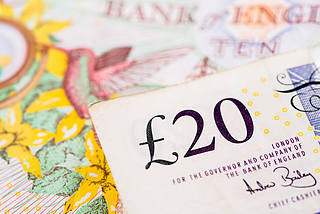
GBP/USD weakens to near 1.3060 in Monday’s early European session.
The US PPI inflation slowed further in September.
The dovish stance of the BoE continues to weigh on the GBP.
The GBP/USD pair trades with mild losses around 1.3060 during the early European session on Monday. The safe-haven flows amid rising geopolitical risks underpin the Greenback and drag the major pair lower. Investors will closely monitor the UK employment data, which is due on Tuesday.
Data released by the US Bureau of Labor Statistics on Friday showed that the annual Producer Price Index (PPI) rose 1.8% YoY in September, compared to a 1.9% increase seen in August, and came in above the market expectation of 1.6%. Meanwhile, the core PPI climbed 2.8% YoY in the same period, surpassing analysts' forecast of 2.7%. On a monthly basis, the US PPI was unchanged in September, while the core PPI was up 0.2% in the same reported period.
Fed officials have now shifted from trying to combat inflation to trying to keep the job market healthy, the other half of their so-called dual mandate. However, a stronger-than-expected jobs report in September and lower bets of another 50 basis points (bps) interest-rate cuts by the Federal Reserve (Fed) in November could lift the USD against the Pound Sterling (GBP).
On the GBP’s front, the dovish remarks from the Bank of England (BoE) Governor Andrew Bailey, saying that the UK central bank might become a bit more aggressive in cutting rates, weigh on the Cable. The markets have priced in a 90% chance that the BoE will cut rates in November. The BoE’s Monetary Policy Committee (MPC) will meet on November 7 to announce their decision on the interest rate. Ahead of the key UK event, the UK employment data on Tuesday will be closely watched and might offer some hints about the labour market condition, and UK interest rate outlook.
Pound Sterling FAQs
The Pound Sterling (GBP) is the oldest currency in the world (886 AD) and the official currency of the United Kingdom. It is the fourth most traded unit for foreign exchange (FX) in the world, accounting for 12% of all transactions, averaging $630 billion a day, according to 2022 data. Its key trading pairs are GBP/USD, also known as ‘Cable’, which accounts for 11% of FX, GBP/JPY, or the ‘Dragon’ as it is known by traders (3%), and EUR/GBP (2%). The Pound Sterling is issued by the Bank of England (BoE).
The single most important factor influencing the value of the Pound Sterling is monetary policy decided by the Bank of England. The BoE bases its decisions on whether it has achieved its primary goal of “price stability” – a steady inflation rate of around 2%. Its primary tool for achieving this is the adjustment of interest rates. When inflation is too high, the BoE will try to rein it in by raising interest rates, making it more expensive for people and businesses to access credit. This is generally positive for GBP, as higher interest rates make the UK a more attractive place for global investors to park their money. When inflation falls too low it is a sign economic growth is slowing. In this scenario, the BoE will consider lowering interest rates to cheapen credit so businesses will borrow more to invest in growth-generating projects.
Data releases gauge the health of the economy and can impact the value of the Pound Sterling. Indicators such as GDP, Manufacturing and Services PMIs, and employment can all influence the direction of the GBP. A strong economy is good for Sterling. Not only does it attract more foreign investment but it may encourage the BoE to put up interest rates, which will directly strengthen GBP. Otherwise, if economic data is weak, the Pound Sterling is likely to fall.
Another significant data release for the Pound Sterling is the Trade Balance. This indicator measures the difference between what a country earns from its exports and what it spends on imports over a given period. If a country produces highly sought-after exports, its currency will benefit purely from the extra demand created from foreign buyers seeking to purchase these goods. Therefore, a positive net Trade Balance strengthens a currency and vice versa for a negative balance.
* The content presented above, whether from a third party or not, is considered as general advice only. This article should not be construed as containing investment advice, investment recommendations, an offer of or solicitation for any transactions in financial instruments.


